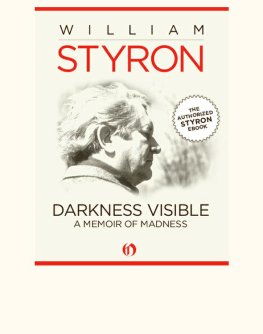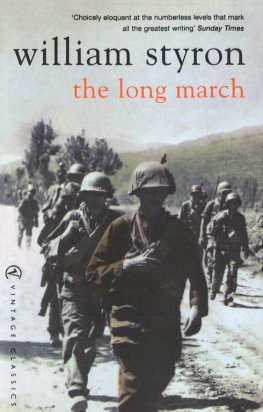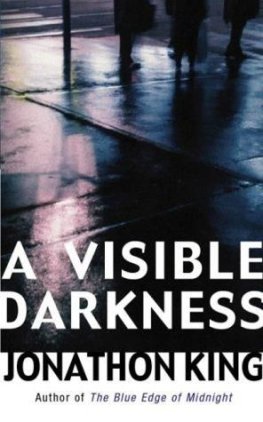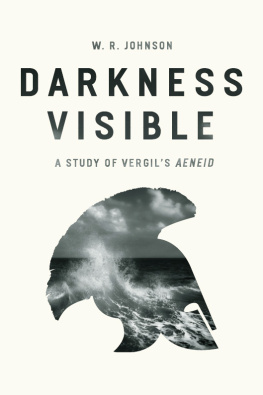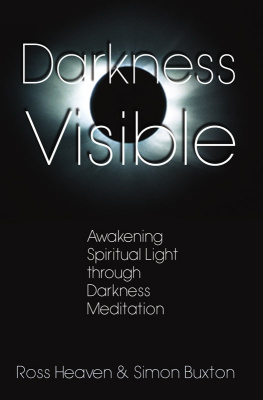William Styron - Darkness Visible
Here you can read online William Styron - Darkness Visible full text of the book (entire story) in english for free. Download pdf and epub, get meaning, cover and reviews about this ebook. City: New York, year: 2010, publisher: Open Road Integrated Media, genre: Non-fiction / Science. Description of the work, (preface) as well as reviews are available. Best literature library LitArk.com created for fans of good reading and offers a wide selection of genres:
Romance novel
Science fiction
Adventure
Detective
Science
History
Home and family
Prose
Art
Politics
Computer
Non-fiction
Religion
Business
Children
Humor
Choose a favorite category and find really read worthwhile books. Enjoy immersion in the world of imagination, feel the emotions of the characters or learn something new for yourself, make an fascinating discovery.
- Book:Darkness Visible
- Author:
- Publisher:Open Road Integrated Media
- Genre:
- Year:2010
- City:New York
- ISBN:978-1-936317-29-5
- Rating:3 / 5
- Favourites:Add to favourites
- Your mark:
- 60
- 1
- 2
- 3
- 4
- 5
Darkness Visible: summary, description and annotation
We offer to read an annotation, description, summary or preface (depends on what the author of the book "Darkness Visible" wrote himself). If you haven't found the necessary information about the book — write in the comments, we will try to find it.
Darkness Visible — read online for free the complete book (whole text) full work
Below is the text of the book, divided by pages. System saving the place of the last page read, allows you to conveniently read the book "Darkness Visible" online for free, without having to search again every time where you left off. Put a bookmark, and you can go to the page where you finished reading at any time.
Font size:
Interval:
Bookmark:
William Styron
DARKNESS VISIBLE
A Memoir of Madness
To Rose
For the thing which
I greatly feared is come upon me,
and that which I was afraid of
Is come unto me.
I was not in safety, neither
had I rest, neither was I quiet;
yet trouble came.
JobAUTHORS NOTE
This book began as a lecture given in Baltimore in May 1989 at a symposium on affective disorders sponsored by the Department of Psychiatry of The Johns Hopkins University School of Medicine. Greatly expanded, the text became an essay published in December of that year in Vanity Fair. I had originally intended to begin with a narrative of a trip I made to Parisa trip which had special significance for me in terms of the development of the depressive illness from which I had suffered. But despite the exceptionally ample amount of space I was given by the magazine, there was an inevitable limit, and I had to discard this part in favor of other matters I wanted to deal with. In the present version, that section has been restored to its place at the beginning. Except for a few relatively minor changes and additions, the rest of the text remains as it originally appeared.
W. S.
I
IN PARIS ON A CHILLY EVENING LATE IN OCTOBER OF 1985 I first became fully aware that the struggle with the disorder in my minda struggle which had engaged me for several monthsmight have a fatal outcome. The moment of revelation came as the car in which I was riding moved down a rain-slick street not far from the Champs-lyses and slid past a dully glowing neon sign that read HTEL WASHINGTON. I had not seen that hotel in nearly thirty-five years, since the spring of 1952, when for several nights it had become my initial Parisian roosting place. In the first few months of my Wanderjahr, I had come down to Paris by train from Copenhagen, and landed at the Htel Washington through the whimsical determination of a New York travel agent. In those days the hotel was one of the many damp, plain hostelries made for tourists, chiefly American, of very modest means who, if they were like mecolliding nervously for the first time with the French and their droll kinkswould always remember how the exotic bidet, positioned solidly in the drab bedroom, along with the toilet far down the ill-lit hallway, virtually defined the chasm between Gallic and Anglo-Saxon cultures. But I stayed at the Washington for only a short time. Within days I had been urged out of the place by some newly found young American friends who got me installed in an even seedier but more colorful hotel in Montparnasse, hard by Le Dme and other suitably literary hangouts. (In my mid-twenties, I had just published a first novel and was a celebrity, though one of very low rank since few of the Americans in Paris had heard of my book, let alone read it.) And over the years the Htel Washington gradually disappeared from my consciousness.
It reappeared, however, that October night when I passed the gray stone faade in a drizzle, and the recollection of my arrival so many years before started flooding back, causing me to feel that I had come fatally full circle. I recall saying to myself that when I left Paris for New York the next morning it would be a matter of forever. I was shaken by the certainty with which I accepted the idea that I would never see France again, just as I would never recapture a lucidity that was slipping away from me with terrifying speed.
Only days before I had concluded that I was suffering from a serious depressive illness, and was floundering helplessly in my efforts to deal with it. I wasnt cheered by the festive occasion that had brought me to France. Of the many dreadful manifestations of the disease, both physical and psychological, a sense of self-hatredor, put less categorically, a failure of self-esteemis one of the most universally experienced symptoms, and I had suffered more and more from a general feeling of worthlessness as the malady had progressed. My dank joylessness was therefore all the more ironic because I had flown on a rushed four-day trip to Paris in order to accept an award which should have sparklingly restored my ego. Earlier that summer I received word that I had been chosen to receive the Prix Mondial Cino del Duca, given annually to an artist or scientist whose work reflects themes or principles of a certain humanism. The prize was established in memory of Cino del Duca, an immigrant from Italy who amassed a fortune just before and after World War II by printing and distributing cheap magazines, principally comic books, though later branching out into publications of quality; he became proprietor of the newspaper Paris-Jour. He also produced movies and was a prominent racehorse owner, enjoying the pleasure of having many winners in France and abroad. Aiming for nobler cultural satisfactions, he evolved into a renowned philanthropist and along the way established a book-publishing firm that began to produce works of literary merit (by chance, my first novel, Lie Down in Darkness, was one of del Ducas offerings, in a translation entitled Un Lit de Tnbres); by the time of his death in 1967 this house, ditions Mondiales, became an important entity of a multifold empire that was rich yet prestigious enough for there to be scant memory of its comic-book origins when del Ducas widow, Simone, created a foundation whose chief function was the annual bestowal of the eponymous award.
The Prix Mondial Cino del Duca has become greatly respected in Francea nation pleasantly besotted with cultural prizegivingnot only for its eclecticism and the distinction shown in the choice of its recipients but for the openhandedness of the prize itself, which that year amounted to approximately $25,000. Among the winners during the past twenty years have been Konrad Lorenz, Alejo Carpentier, Jean Anouilh, Ignazio Silone, Andrei Sakharov, Jorge Luis Borges and one American, Lewis Mumford. (No women as yet, feminists take note.) As an American, I found it especially hard not to feel honored by inclusion in their company. While the giving and receiving of prizes usually induce from all sources an unhealthy uprising of false modesty, backbiting, self-torture and envy, my own view is that certain awards, though not necessary, can be very nice to receive. The Prix del Duca was to me so straightforwardly nice that any extensive self-examination seemed silly, and so I accepted gratefully, writing in reply that I would honor the reasonable requirement that I be present for the ceremony. At that time I looked forward to a leisurely trip, not a hasty turnaround. Had I been able to foresee my state of mind as the date of the award approached, I would not have accepted at all.
Depression is a disorder of mood, so mysteriously painful and elusive in the way it becomes known to the selfto the mediating intellectas to verge close to being beyond description. It thus remains nearly incomprehensible to those who have not experienced it in its extreme mode, although the gloom, the blues which people go through occasionally and associate with the general hassle of everyday existence are of such prevalence that they do give many individuals a hint of the illness in its catastrophic form. But at the time of which I write I had descended far past those familiar, manageable doldrums. In Paris, I am able to see now, I was at a critical stage in the development of the disease, situated at an ominous way station between its unfocused stirrings earlier that summer and the near-violent denouement of December, which sent me into the hospital. I will later attempt to describe the evolution of this malady, from its earliest origins to my eventual hospitalization and recovery, but the Paris trip has retained a notable meaning for me.
On the day of the award ceremony, which was to take place at noon and be followed by a formal luncheon, I woke up at midmorning in my room at the Htel Pont-Royal commenting to myself that I felt reasonably sound, and I passed the good word along to my wife, Rose. Aided by the minor tranquilizer Halcion, I had managed to defeat my insomnia and get a few hours sleep. Thus I was in fair spirits. But such wan cheer was an habitual pretense which I knew meant very little, for I was certain to feel ghastly before nightfall. I had come to a point where I was carefully monitoring each phase of my deteriorating condition. My acceptance of the illness followed several months of denial during which, at first, I had ascribed the malaise and restlessness and sudden fits of anxiety to withdrawal from alcohol; I had abruptly abandoned whiskey and all other intoxicants that June. During the course of my worsening emotional climate I had read a certain amount on the subject of depression, both in books tailored for the layman and in weightier professional works including the psychiatrists bible,
Font size:
Interval:
Bookmark:
Similar books «Darkness Visible»
Look at similar books to Darkness Visible. We have selected literature similar in name and meaning in the hope of providing readers with more options to find new, interesting, not yet read works.
Discussion, reviews of the book Darkness Visible and just readers' own opinions. Leave your comments, write what you think about the work, its meaning or the main characters. Specify what exactly you liked and what you didn't like, and why you think so.

